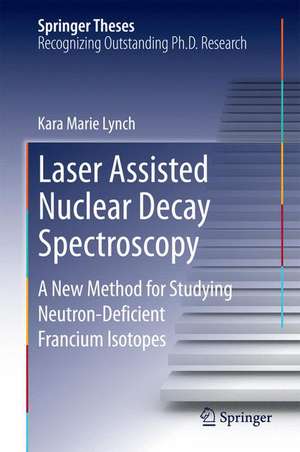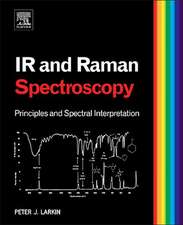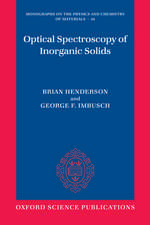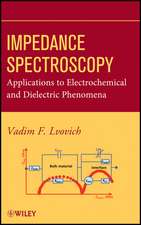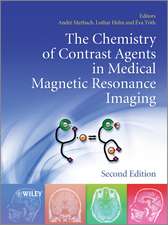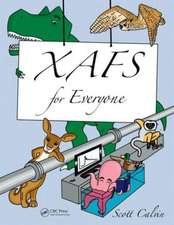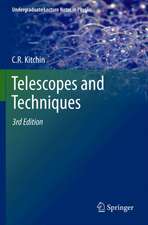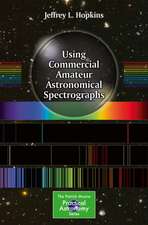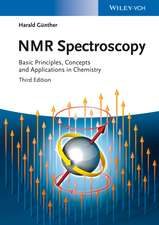Laser Assisted Nuclear Decay Spectroscopy: A New Method for Studying Neutron-Deficient Francium Isotopes: Springer Theses
Autor Kara Marie Lynchen Limba Engleză Hardback – 31 iul 2014
| Toate formatele și edițiile | Preț | Express |
|---|---|---|
| Paperback (1) | 633.19 lei 6-8 săpt. | |
| Springer International Publishing – 10 sep 2016 | 633.19 lei 6-8 săpt. | |
| Hardback (1) | 639.25 lei 6-8 săpt. | |
| Springer International Publishing – 31 iul 2014 | 639.25 lei 6-8 săpt. |
Din seria Springer Theses
- 18%
 Preț: 997.88 lei
Preț: 997.88 lei -
 Preț: 389.88 lei
Preț: 389.88 lei - 15%
 Preț: 646.94 lei
Preț: 646.94 lei - 18%
 Preț: 943.43 lei
Preț: 943.43 lei -
 Preț: 399.29 lei
Preț: 399.29 lei - 18%
 Preț: 944.99 lei
Preț: 944.99 lei - 15%
 Preț: 636.80 lei
Preț: 636.80 lei - 18%
 Preț: 941.05 lei
Preț: 941.05 lei - 15%
 Preț: 643.16 lei
Preț: 643.16 lei - 15%
 Preț: 642.68 lei
Preț: 642.68 lei - 18%
 Preț: 1103.62 lei
Preț: 1103.62 lei - 20%
 Preț: 558.83 lei
Preț: 558.83 lei - 18%
 Preț: 1112.30 lei
Preț: 1112.30 lei - 18%
 Preț: 944.19 lei
Preț: 944.19 lei - 18%
 Preț: 1109.92 lei
Preț: 1109.92 lei - 18%
 Preț: 1217.27 lei
Preț: 1217.27 lei - 15%
 Preț: 640.06 lei
Preț: 640.06 lei - 15%
 Preț: 636.45 lei
Preț: 636.45 lei - 15%
 Preț: 640.06 lei
Preț: 640.06 lei - 15%
 Preț: 640.88 lei
Preț: 640.88 lei -
 Preț: 389.70 lei
Preț: 389.70 lei - 20%
 Preț: 563.91 lei
Preț: 563.91 lei -
 Preț: 393.35 lei
Preț: 393.35 lei - 15%
 Preț: 637.93 lei
Preț: 637.93 lei - 15%
 Preț: 641.85 lei
Preț: 641.85 lei - 18%
 Preț: 1225.94 lei
Preț: 1225.94 lei - 20%
 Preț: 551.36 lei
Preț: 551.36 lei - 18%
 Preț: 1229.10 lei
Preț: 1229.10 lei - 15%
 Preț: 639.25 lei
Preț: 639.25 lei - 18%
 Preț: 999.45 lei
Preț: 999.45 lei - 15%
 Preț: 640.06 lei
Preț: 640.06 lei - 18%
 Preț: 1220.45 lei
Preț: 1220.45 lei - 18%
 Preț: 1116.26 lei
Preț: 1116.26 lei - 18%
 Preț: 1110.72 lei
Preț: 1110.72 lei - 18%
 Preț: 1000.87 lei
Preț: 1000.87 lei - 18%
 Preț: 891.17 lei
Preț: 891.17 lei - 15%
 Preț: 640.06 lei
Preț: 640.06 lei - 5%
 Preț: 1154.07 lei
Preț: 1154.07 lei - 15%
 Preț: 635.96 lei
Preț: 635.96 lei - 15%
 Preț: 640.88 lei
Preț: 640.88 lei -
 Preț: 387.20 lei
Preț: 387.20 lei - 18%
 Preț: 1109.92 lei
Preț: 1109.92 lei -
 Preț: 385.25 lei
Preț: 385.25 lei -
 Preț: 385.25 lei
Preț: 385.25 lei - 18%
 Preț: 1112.30 lei
Preț: 1112.30 lei - 18%
 Preț: 999.45 lei
Preț: 999.45 lei -
 Preț: 386.99 lei
Preț: 386.99 lei - 15%
 Preț: 637.13 lei
Preț: 637.13 lei - 20%
 Preț: 554.21 lei
Preț: 554.21 lei - 20%
 Preț: 555.59 lei
Preț: 555.59 lei
Preț: 639.25 lei
Preț vechi: 752.06 lei
-15% Nou
Puncte Express: 959
Preț estimativ în valută:
122.36€ • 132.95$ • 102.85£
122.36€ • 132.95$ • 102.85£
Carte tipărită la comandă
Livrare economică 21 aprilie-05 mai
Preluare comenzi: 021 569.72.76
Specificații
ISBN-13: 9783319071114
ISBN-10: 3319071114
Pagini: 131
Ilustrații: XIII, 131 p. 95 illus., 46 illus. in color.
Dimensiuni: 155 x 235 x 15 mm
Greutate: 0.39 kg
Ediția:2015
Editura: Springer International Publishing
Colecția Springer
Seria Springer Theses
Locul publicării:Cham, Switzerland
ISBN-10: 3319071114
Pagini: 131
Ilustrații: XIII, 131 p. 95 illus., 46 illus. in color.
Dimensiuni: 155 x 235 x 15 mm
Greutate: 0.39 kg
Ediția:2015
Editura: Springer International Publishing
Colecția Springer
Seria Springer Theses
Locul publicării:Cham, Switzerland
Public țintă
ResearchCuprins
Theoretical Considerations for Laser Spectroscopy.- Theoretical Considerations for Nuclear Decay Spectroscopy.- Experimental Setup at ISOLDE.- Collinear Resonance Ionization Spectroscopy.- Laser Assisted Nuclear Decay Spectroscopy.- Spectroscopic Studies of neutron-Deficient Francium.- Interpretation of Results.
Textul de pe ultima copertă
This work details an application of collinear resonance ionization spectroscopy for the separation of short-lived isomeric states and their subsequent study with decay spectroscopy. It reports the successful construction of a novel decay spectroscopy apparatus that can operate at pressures below 1 x 10^-9 mbar. The method is demonstrated by separating the nuclear ground and isomeric states of 204Fr and performing alpha-decay spectroscopy. An equivalent mass spectrometer would require 4.6 million times as much resolution to achieve the same result. This work unambiguously confirms the existence of a second isomeric state in 204Fr. The author also demonstrates the effectiveness of this method for laser spectroscopy and identification of hyperfine-structure components with energy tagging. This method was successfully used in 202Fr to identify ground and isomeric states. The measurement of 202Fr reported in this thesis demonstrates a factor of 100 improvement in sensitivity compared to state-of-the-art fluorescence techniques. The work reported in this thesis won the author the IOP Nuclear Physics Group Early Career Prize
Caracteristici
Nominated as an outstanding Ph.D. thesis by the University of Manchester Covers work awarded with the IOP Nuclear Physics Group Early Career Prize in 2013 Contains a detailed description of state-of-the-art collinear resonance ionization spectroscopy and laser-assisted nuclear-decay-spectroscopy techniques Includes the first measurements of the hyperfine structure of the low-lying states in neutron-deficient francium Includes supplementary material: sn.pub/extras
